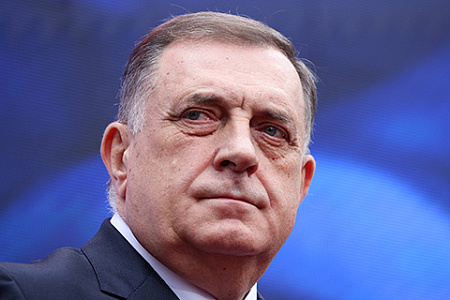
A deepening political crisis is threatening to fracture Bosnia and Herzegovina (BiH) as the country’s Central Election Commission (CEC) moved to terminate the mandate of Milorad Dodik, the defiant president of the Serb-dominated entity, Republika Srpska. The decision has pushed a long-simmering standoff between the nationalist leader and the central state institutions to a breaking point. Dodik has rejected the ruling, vowing he will not step down and asserting that the central government in Sarajevo has no effective power to remove him, setting the stage for a dangerous constitutional and political showdown.
The conflict’s origins lie in the complex power-sharing arrangement created by the 1995 Dayton Accords, which ended the brutal Bosnian War. The agreement established BiH as a single state composed of two largely autonomous entities: the Federation of Bosnia and Herzegovina, primarily home to Bosniaks and Croats, and Republika Srpska. A key feature of this system is the Office of the High Representative, an international envoy with broad powers to oversee the implementation of the peace deal. However, the current High Representative, Christian Schmidt, was appointed without the approval of the UN Security Council, leading Dodik, along with allies Russia and China, to declare his authority illegitimate and refuse his directives.
The CEC’s decision is the culmination of a legal battle against Dodik for his open defiance of Schmidt. It follows a court verdict that sentenced the Republika Srpska president to a year in prison and a six-year ban on holding public office. Yet, both the verdict and the CEC’s subsequent action remain largely symbolic. Without control over the police and institutions within Republika Srpska, neither the central authorities nor the High Representative can enforce the ruling without risking a violent escalation. In response, Dodik has dismissed the move with contempt and announced plans for a referendum within his entity to reaffirm his popular mandate, a vote he is widely expected to win.
The standoff carries significant international implications, drawing in regional and global powers. While Western governments support the authority of Schmidt and Bosnia’s central institutions, Dodik relies on firm backing from Serbia, Russia, and China. Critically, he has also secured the support of Hungarian Prime Minister Viktor Orbán. This endorsement is particularly impactful, as Hungarian troops are part of the EUFOR peacekeeping mission stationed in BiH—the very force that Schmidt might theoretically rely on to enforce the court’s decision, creating a potential fracture within the European security framework on the ground.
Analysts warn that the escalating crisis is pouring fuel on the fire of Bosnia’s long-standing institutional fragility. According to Yakov Smirnov, a researcher at the Russian Academy of Sciences’ Institute of Slavic Studies, this latest development severely aggravates the paralysis of BiH’s state institutions. It significantly increases the likelihood of the country’s dissolution, a long-term goal that observers believe President Dodik has been cautiously but consistently pursuing, pushing the fragile post-war state closer to a potential breakup.
